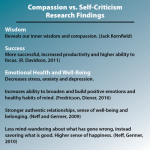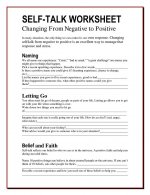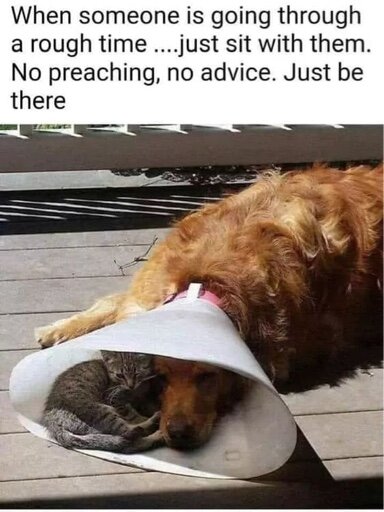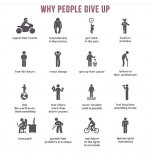- Articles
- Forum Archive
- Psychology, Psychiatry, Psychotherapy, and Health
- Therapy, Therapists, and Self-Help
- Coping Strategies
You are using an out of date browser. It may not display this or other websites correctly.
You should upgrade or use an alternative browser.
You should upgrade or use an alternative browser.
- Thread starter Daniel E.
- Start date
-
- Tags
- coping tips
More threads by Daniel E.
The Scientific Underpinnings and Impacts of Shame -- Stanford BeWell

“Learning to be self-forgiving is a skill that requires practice. Over time, you will notice that you are more relaxed, open and happy. You will be able to notice and appreciate how much pleasure can be found in a simple moment, how much there is to be grateful for in everyday life, and how much the world needs you and your special gifts and talents.”

“Learning to be self-forgiving is a skill that requires practice. Over time, you will notice that you are more relaxed, open and happy. You will be able to notice and appreciate how much pleasure can be found in a simple moment, how much there is to be grateful for in everyday life, and how much the world needs you and your special gifts and talents.”
A First Aid Kit for When Life Falls Apart
By Helena Önneby
...I wrote this poem to myself a few years back, to remind myself. I think it sums it up quite perfectly.
To me, if I ever end up there again, and to anyone else, who's ever been there, or are right now, in the black hole:
It will get better. There is a meaning to what you're going through.
You will feel like living again.
If you can't do anything else but breathe, do just that; you don't have to do anything else.
Don't fight it. Let it be. It is as it should be and it's okay. Just be. Don't judge. Let go.
Look at what's beautiful. Listen to what gives you peace. Eat what tastes good. Do what feels nice. Even if it feels pointless right now, it's good for your soul.
Ask for help.
Let other people help you. Let other people take care of you.
Cry. Scream. Wail. Laugh. Sleep. Close your eyes. Do whatever you need to do. Let it out. And embrace.
It will get better. I promise.
By Helena Önneby
...I wrote this poem to myself a few years back, to remind myself. I think it sums it up quite perfectly.
To me, if I ever end up there again, and to anyone else, who's ever been there, or are right now, in the black hole:
It will get better. There is a meaning to what you're going through.
You will feel like living again.
If you can't do anything else but breathe, do just that; you don't have to do anything else.
Don't fight it. Let it be. It is as it should be and it's okay. Just be. Don't judge. Let go.
Look at what's beautiful. Listen to what gives you peace. Eat what tastes good. Do what feels nice. Even if it feels pointless right now, it's good for your soul.
Ask for help.
Let other people help you. Let other people take care of you.
Cry. Scream. Wail. Laugh. Sleep. Close your eyes. Do whatever you need to do. Let it out. And embrace.
It will get better. I promise.
How to Boost Resilience in Midlife
Don't Personalize It. We have a tendency to blame ourselves for life's setbacks and to ruminate about what we should have done differently. In the moment, a difficult situation feels as if it will never end. To bolster your resilience, remind yourself that even if you made a mistake, a number of factors most likely contributed to the problem and shift your focus to the next steps you should take.
Telling yourself that a situation is not personal, pervasive or permanent can be extremely useful...There is almost no failure that is totally personal.
Don't Personalize It. We have a tendency to blame ourselves for life's setbacks and to ruminate about what we should have done differently. In the moment, a difficult situation feels as if it will never end. To bolster your resilience, remind yourself that even if you made a mistake, a number of factors most likely contributed to the problem and shift your focus to the next steps you should take.
Telling yourself that a situation is not personal, pervasive or permanent can be extremely useful...There is almost no failure that is totally personal.
The Surprising Boost You Get From Strangers - WSJ
Sometimes a stranger—not a friend or a loved one—can significantly improve our day. A pleasant encounter with someone we don’t know, even a nonverbal one, can soothe us when no one else is around. It may get us out of our own head—a proven mood booster—and help broaden our perspective.
Sometimes a stranger—not a friend or a loved one—can significantly improve our day. A pleasant encounter with someone we don’t know, even a nonverbal one, can soothe us when no one else is around. It may get us out of our own head—a proven mood booster—and help broaden our perspective.
How to Disagree with Someone More Powerful than You
Harvard Business Review
Principles to Remember
Do:
Don't:
Harvard Business Review
Principles to Remember
Do:
- Explain that you have a different opinion and ask if you can voice it.
- Restate the original point of view or decision so it's clear you understand it.
- Speak slowly -- talking in an even tone calms you and the other person down.
Don't:
- Assume that disagreeing is going to damage your relationship or career - the consequences are often less dramatic than we think.
- State your opinions as facts; simply express your point of view and be open to dialogue.
- Use judgment words, such as "hasty," "foolish," or "wrong," that might upset or incite your counterpart.
David Baxter PhD
Late Founder
How to Disarm Internal Triggers of Distractions
...The "leaves on a stream" method. When feeling the uncomfortable internal trigger to do something you'd rather not, "imagine you are seated beside a gently flowing stream," he says. "Then imagine there are leaves floating down that stream. Place each thought in your mind on each leaf. It could be a memory, a word, a worry, an image. And let each of those leaves float down that stream, swirling away, as you sit and just watch."
...The "leaves on a stream" method. When feeling the uncomfortable internal trigger to do something you'd rather not, "imagine you are seated beside a gently flowing stream," he says. "Then imagine there are leaves floating down that stream. Place each thought in your mind on each leaf. It could be a memory, a word, a worry, an image. And let each of those leaves float down that stream, swirling away, as you sit and just watch."
De-Stress Yourself: Expert Tips for Coping With Financial Anxiety | The Motley Fool
...To let something that has a 1-2% chance of happening run your life, then it's probably not the healthiest way to go about it...
I'm an "awfulizer." I'm always afraid of the worst-case scenario. And my wife, who has experience as a cognitive behavioral therapist, has said to me that this is what you do. You ask yourself what the worst-case scenario is, and you think about it. And No. 1, how likely is that really to happen, and No. 2, would it be OK if it happened? Would you still survive? Would the important things still be there?
...To let something that has a 1-2% chance of happening run your life, then it's probably not the healthiest way to go about it...
I'm an "awfulizer." I'm always afraid of the worst-case scenario. And my wife, who has experience as a cognitive behavioral therapist, has said to me that this is what you do. You ask yourself what the worst-case scenario is, and you think about it. And No. 1, how likely is that really to happen, and No. 2, would it be OK if it happened? Would you still survive? Would the important things still be there?
Navy SEALs Use These 4 Psychology Tricks to Succeed Under Extreme Pressure
I've found in high-stress situations it's more important than ever to omit tones of panic and catastrophizing and replace them with a more focused, "let's just do what needs to be done right now" dialogue.
I've found in high-stress situations it's more important than ever to omit tones of panic and catastrophizing and replace them with a more focused, "let's just do what needs to be done right now" dialogue.
Want to Make Difficult Conversations Easy? Try This 1 Counterintuitive Trick, According to Psychology
...For tough conversations I always pictured having to outline all the things I would say, all the counter arguments I could make, all the pointed statements to share.
Wrong approach.
Bernstein says it's far more important to listen, reflect, and observe. The more you listen, the more likely it is that they will.
And you get more of an opportunity to listen by asking fair questions rather than thinking of the next statement you're going to make. I applied this immediately to a tough conversation I had to have. I set aside all the statements and points I wanted to make, and focused on listening and asking questions in response. I found the other party was much more willing to listen right back. I'm 100 percent certain it led to a better outcome.
Bernstein also says it's important not to fall into a common trap where you're doing too much explaining. Explaining comes across as a veiled form of fighting back. It introduces unnecessary tension into the discussion. You're much better off asking questions. And as you listen to their answers, it's important to show empathy and try to truly understand, not judge. Ask yourself ,"Why are they saying this?"
Again, I applied this as well to the tough conversation I had to have. I'll admit it was really hard. I wanted to go into explaining mode on about five occasions but I resisted. When I really concentrated on asking myself why the other person was saying certain things, it was powerful. I could feel my "heat-meter" dropping...
...For tough conversations I always pictured having to outline all the things I would say, all the counter arguments I could make, all the pointed statements to share.
Wrong approach.
Bernstein says it's far more important to listen, reflect, and observe. The more you listen, the more likely it is that they will.
And you get more of an opportunity to listen by asking fair questions rather than thinking of the next statement you're going to make. I applied this immediately to a tough conversation I had to have. I set aside all the statements and points I wanted to make, and focused on listening and asking questions in response. I found the other party was much more willing to listen right back. I'm 100 percent certain it led to a better outcome.
Bernstein also says it's important not to fall into a common trap where you're doing too much explaining. Explaining comes across as a veiled form of fighting back. It introduces unnecessary tension into the discussion. You're much better off asking questions. And as you listen to their answers, it's important to show empathy and try to truly understand, not judge. Ask yourself ,"Why are they saying this?"
Again, I applied this as well to the tough conversation I had to have. I'll admit it was really hard. I wanted to go into explaining mode on about five occasions but I resisted. When I really concentrated on asking myself why the other person was saying certain things, it was powerful. I could feel my "heat-meter" dropping...
The introverts guide to making friends in Charlotte - Charlotte Agenda
The main thing holding back most people from making new friends is the fear of rejection. Somewhere in our heads we think the bar and the boardroom is just like the high school in the movie Mean Girls, where everyone is judging each other constantly and waiting for any opportunity to cut someone else down. But that’s really not the case...
People want to be your friend.
People want to have a conversation with you and learn more about you. People want to laugh at your jokes. People want to be able to text you when they’re bored. People want to get drinks with you after work.
So why aren’t they doing it? Because they’re afraid of rejection just like you are. You’ll be shocked at how many people are extremely receptive of new conversations and social plans when they don’t have to be the one who suggests.
The main thing holding back most people from making new friends is the fear of rejection. Somewhere in our heads we think the bar and the boardroom is just like the high school in the movie Mean Girls, where everyone is judging each other constantly and waiting for any opportunity to cut someone else down. But that’s really not the case...
People want to be your friend.
People want to have a conversation with you and learn more about you. People want to laugh at your jokes. People want to be able to text you when they’re bored. People want to get drinks with you after work.
So why aren’t they doing it? Because they’re afraid of rejection just like you are. You’ll be shocked at how many people are extremely receptive of new conversations and social plans when they don’t have to be the one who suggests.
David Baxter PhD
Late Founder
Could our efforts to avoid anxiety only be making it worse? - The Washington Post
The evolutionary mismatch hypothesis suggests several approaches for reducing anxiety: Disconnect occasionally from electronic devices, move more -- preferably in nature -- sleep enough and without distractions, and prioritize in-person time with friends and family.
These changes need not be dramatic. Research shows that disconnecting from Facebook alone for a few days can lead to lower stress. If starting an exercise regimen sounds daunting, begin by walking a few minutes a day and gradually increase the time. Interrupting long periods of sitting with even short bursts of activity has proved to help. If sleep frequently eludes you, turn off all electronic devices at least an hour before bed and remove them from your room. Keeping your bedroom dark and cool will also promote good sleep. Finally, make a list of all the people who are important to you and with whom you've kept in touch only via social media for a while. Then call them and set up a time to meet.
The evolutionary mismatch hypothesis suggests several approaches for reducing anxiety: Disconnect occasionally from electronic devices, move more -- preferably in nature -- sleep enough and without distractions, and prioritize in-person time with friends and family.
These changes need not be dramatic. Research shows that disconnecting from Facebook alone for a few days can lead to lower stress. If starting an exercise regimen sounds daunting, begin by walking a few minutes a day and gradually increase the time. Interrupting long periods of sitting with even short bursts of activity has proved to help. If sleep frequently eludes you, turn off all electronic devices at least an hour before bed and remove them from your room. Keeping your bedroom dark and cool will also promote good sleep. Finally, make a list of all the people who are important to you and with whom you've kept in touch only via social media for a while. Then call them and set up a time to meet.
Replying is not possible. This forum is only available as an archive.
Similar threads
- Replies
- 0
- Views
- 2K
- Replies
- 0
- Views
- 2K
- Replies
- 0
- Views
- 2K
- Replies
- 149
- Views
- 39K
- Replies
- 36
- Views
- 8K









